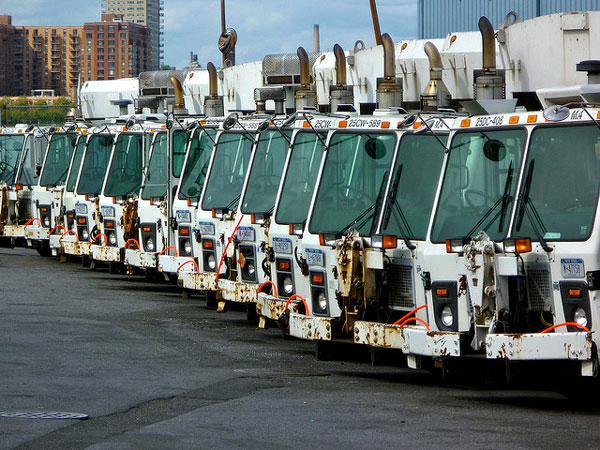
Photo by: BriYYZ, courtesy of Flickr
Department of Sanitation garbage trucks sit idle in a parking lot. Because the city doesn’t haul commercial waste, it has had little information about how much businesses are actually recycling.
Nearly every day an armada of garbage and recycling trucks rumbles through the streets of New York, picking up from businesses an estimated 37,500 tons of waste and recyclables for transport to landfills, incinerators, and recycling sorting facilities. Now, the city wants to know how frequently various types of business recycle, which is a good question considering that for about 18 years the law has required it.
“The most urgent need when it comes to commercial recycling,” said Eric Goldstein, New York urban program director for the Natural Resources Defense Council (NRDC), “is getting better data.”
Last month, Mayor Bloomberg signed into law, along with 10 other recycling-related bills, a bill designed to get that information. The law, Int. 141, requires that the Department of Sanitation (DSNY) complete a comprehensive study of commercial waste by 2012. “The study will gather as much data as possible about the various factors that make up the commercial sector in New York City,” said Matthew Lipani of the DSNY. In addition to calculating the rate of recycling among various types of business, the study will analyze the operations of the private companies that cart the waste of the city’s businesses, and the composition of their waste and recyclables. “The intent of the study,” said Lipani, “is to take the equivalent of a census of the commercial sector.”
Since 1992, The Commercial Recycling Law has required New York City businesses to recycle, and their combined trash and recyclables make up about 75 percent of all waste generated in the city. But because commercial waste is hauled by private carters, rather than by the DSNY, the city has had little information about how much businesses are actually recycling.
Approximately 1,500 private carters are licensed to haul commercial waste in the city. A spokesperson for the agency that monitors them, the Business Integrity Commission, said the agency collects from each private carter reports about the types of materials they pick up and deposit, how much it all weighs, and who their customers are. But the spokesperson, Hope Kennedy, said the agency doesn’t know how much waste is being diverted to recycling in the commercial sector.
Proponents of Int. 141, such as the NRDC, say the commercial waste study will lead to additional legislation to invigorate recycling among New York City businesses.
New York City businesses arrange their own waste management and recycling by choosing for themselves one of the city’s licensed private carters. Frank, a manager at Bravo Pizza on Park Avenue and 21st Street, declined to give his last name, but said the biggest obstacle to recycling, at his business and others, is customers not separating trash and recycling correctly.
Reilly Owens, a manager at an organic vegan restaurant in the East Village, said that his restaurant has been working with the same private hauler for years, and that they face no particular obstacles to recycling. They throw away about nine bags of garbage per night, compost about two bags per night, recycle about one bag of bottles and cans per night, recycle about 20 cardboard boxes per night, and recycle about one bag of paper per week.
Pablo Espinal, a manager at an Associated Supermarket in Brooklyn, said his store recycles customer shopping bags and has machines for customers to recycle cans and plastic and glass bottles, but that the store itself does not recycle because the private hauler they use, Five Star Carting, separates trash from recycling.
Lipani said that New York City might consider taking on a larger role in commercial waste management, depending on the findings of the forthcoming study. Responsibility for commercial waste collection was transferred from the DSNY to private carters in the 1950s.
Seattle, one of the nation’s leaders in recycling, doesn’t have a multitude of private companies carting commercial waste. The city manages two private contractors that haul both commercial and residential waste. San Francisco, another city known for a successful recycling program, also has a simple waste management system. It contracts with just one company that hauls commercial and residential waste. San Francisco businesses that send more waste to the landfill pay more for waste management services, encouraging them to recycle more.
Other components of New York City’s new recycling legislation package, besides the bill that addresses commercial waste, include an expansion of the kinds of plastic that can be recycled, an increase in the number of public recycling receptacles in the city from 300 to 1000, the development of a comprehensive clothing recycling system, and an increased emphasis on recycling in schools.








